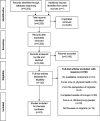Health professionals' experiences of and attitudes towards mental healthcare for migrants and refugees in Europe: A qualitative systematic review
- PMID: 34986056
- PMCID: PMC10074763
- DOI: 10.1177/13634615211067360
Health professionals' experiences of and attitudes towards mental healthcare for migrants and refugees in Europe: A qualitative systematic review
Abstract
Migrants living in Europe constitute over half of the world's international migrants and are at higher risk of poor mental health than non-migrants, yet also face more barriers in accessing and engaging with services. Furthermore, the quality of care received is shaped by the experiences and attitudes of health professionals. The aim of this review was to identify professionals' attitudes towards migrants receiving mental healthcare and their perceptions of barriers and facilitators to service provision. Four electronic databases were searched, and 23 studies met the inclusion criteria. Using thematic synthesis, we identified three themes: 1) the management of multifaceted and complex challenges associated with the migrant status; 2) professionals' emotional responses to working with migrants; and 3) delivering care in the context of cultural difference. Professionals employed multiple strategies to overcome challenges in providing care yet attitudes towards this patient group were polarized. Professionals described mental health issues as being inseparable from material and social disadvantage, highlighting a need for effective collaboration between health services and voluntary organizations, and partnerships with migrant communities. Specialist supervision, reflective practice, increased training for professionals, and the adoption of a person-centered approach are also needed to overcome the current challenges in meeting migrants' needs. The challenges experienced by health professionals in attempting to meet migrant needs reflect frustrations in being part of a system with insufficient resources and without universal access to care that effectively stigmatizes the migrant status.
Keywords: Europe; healthcare professional attitudes; mental health; mental health services; migrants; thematic synthesis.
Conflict of interest statement
The author(s) declared no potential conflicts of interest with respect to the research, authorship, and/or publication of this article.
Figures
References
-
- Ahmed S., Lee S., Shommu N., Rumana N., Turin T. (2017). Experiences of communication barriers between physicians and immigrant patients: A systematic review and thematic synthesis. Patient Experience Journal, 4(1), 13. 10.35680/2372-0247.1181 - DOI
-
- Al-Roubaiy N. S., Owen-Pugh V., Wheeler S. (2017). Iraqi refugee men's experiences of psychotherapy: Clinical implications and the proposal of a plural model. Diversity, Alterity and Pluralism, 45(5), 463–472. 10.1080/03069885.2017.1370534 - DOI
-
- Andersen J., Larsen J., Møller I. H. (2009). Exclusion and marginalisation of immigrants in the Danish welfare society: Dilemmas and challenges. International Journal of Sociology and Social Policy, 29(5/6), 274–286. 10.1108/01443330910965804 - DOI
Publication types
MeSH terms
LinkOut - more resources
Full Text Sources
Miscellaneous



